

Les superbactéries déferlent sur le monde prévient l’OCDE. Nous entrons dans l’ère post-antibiotiques. Les bactéries résistantes aux antibiotiques ont causé la mort de 33 100 personnes en 2015 dans l’Union européenne.

Elles ont par ailleurs contaminé 671 689 personnes. Soit un impact « comparable à l’effet cumulé de la grippe, de la tuberculose et du virus du sida », sur la même période, notent des chercheurs européens dans une étude publiée dans la revue The Lancet Infectious Diseases. En France, on estime que la résistance antibiotique cause 12 500 décès par an, selon un rapport remis en 2015 au ministère de la Santé. Si rien ne bouge, le monde se dirige vers une « ère post-antibiotique, dans laquelle les infections courantes pourront recommencer à tuer », répète régulièrement l'Organisation mondiale de la santé (OMS). L'antibiorésistance tue déjà 50.000 patients chaque année aux États-Unis et en Europe, et pourrait causer 10 millions de morts par an dans le monde en 2050, soit plus que le cancer, ont prédit des experts mandatés par le gouvernement britannique.
Geologists discover bacteria that turns small bits of gold into solid nuggets. Bacteria Are Evolving To Eat The Plastic We Dump Into The Oceans. The ocean is full of plastic, a grim marker of the Anthropocene.
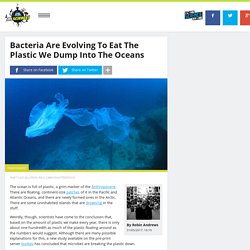
There are floating, continent-size patches of it in the Pacific and Atlantic Oceans, and there are newly formed ones in the Arctic. There are some uninhabited islands that are drowning in the stuff. ?articles. Researchers Discover Bacteria That Produces Pure Gold. Bacteria eats poison, poops out gold The gold you see in the photo above was not found in a river or a mine.
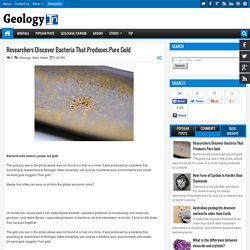
It was produced by a bacteria that, according to researchers at Michigan State University, can survive in extreme toxic environments and create 24-karat gold nuggets. Pure gold. Bacteria Can Make Zero-Viscosity Superfluids. Bacteria can thin liquids to make them flow more easily.
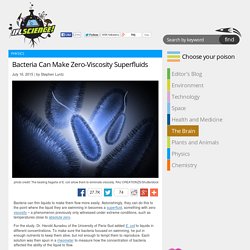
Astonishingly, they can do this to the point where the liquid they are swimming in becomes a superfluid, something with zero viscosity – a phenomenon previously only witnessed under extreme conditions, such as temperatures close to absolute zero. For the study, Dr. Harold Auradou of the University of Paris-Sud added E. coli to liquids in different concentrations. Scientists Find Bacteria That "Breathe" Uranium. Evolutionary Link to Complex Cells Discovered. Few areas in biology are as contentiously debated as how simple cells such as bacteria evolved into complex eukaryotic cells that comprise all of the species within the animal kingdom.
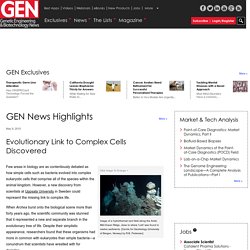
However, a new discovery from scientists at Uppsala University in Sweden could represent the missing link to complex life. When Archea burst onto the biological scene more than forty years ago, the scientific community was stunned that it represented a new and separate branch in the evolutionary tree of life. How microbes define, shape — and might even heal us. Researchers Image What They Believe To Be Smallest Life Possible. Prokaryotes are generally 10 times smaller than eukaryotic cells, but researchers found evidence of bacteria even smaller than that.
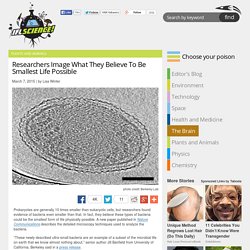
Nitrogen-Fed Bacteria Could Power Our Future. A bacterium that doesn't need its nitrogen preprocessed could breathe new life into environmentally friendly ethanol production, turning mowing the lawn from a chore into an income source.
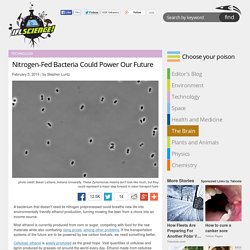
Most ethanol is currently produced from corn or sugar, competing with food for the raw materials while also combating rising prices, among other problems. If the transportation systems of the future are to be powered by low carbon biofuels, we need something better. Cellulosic ethanol is widely promoted as the great hope. Scientists Discover Microbes That Have Remained Essentially Unchanged For 2 Billion Years. Scientists Reveal How Microbe 'Eats' Electricity. Some microbes, simple as they may be, have an ability to gather energy from extreme sources like sulfur, formic acid, minerals, and... electricity?
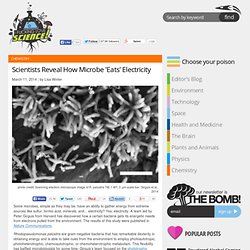
Yes, electricity. A team led by Peter Girguis from Harvard has discovered how a certain bacteria gets its energetic needs from electrons pulled from the environment. Three scientists on how the microbiome shapes our world. You are never really alone.
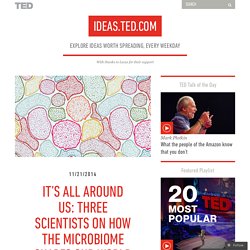
On your skin, in your nose, in every inch of your personal space, you are accompanied by trillions of tiny organisms. Collectively, these microorganisms are known as the microbiome — the complex ecosystem of microbes that share and shape our world. Yet the quest to understand the microbiome is still in its infancy. Bonnie Bassler: How bacteria "talk" Strange Bacteria Dine on Electricity and Link Up to Form Biowires. All living organisms need energy.

Most animals get their energy by eating other organisms. Plants manufacture energy from sunlight. Now, scientists are finding a strange form of bacterial life that dines on unadulterated electricity. But the fact the bacteria live on electricity isn’t the weird part. The Gut Microbe That Protects Against Peanut Allergies. The presence of a common gut microbe called Clostridia protects mice against peanut sensitization by keeping the allergens from entering their bloodstream, according to findings published in Proceedings of the National Academy of Sciences this week. In the U.S., food allergy rates among children rose about 50 percent between 1997 and 2011. Electric Bacteria Eat Electrons. When we eat, our cells break down sugars, while their excess electrons flow through a series of chemical reactions until they’re passed onto oxygen.